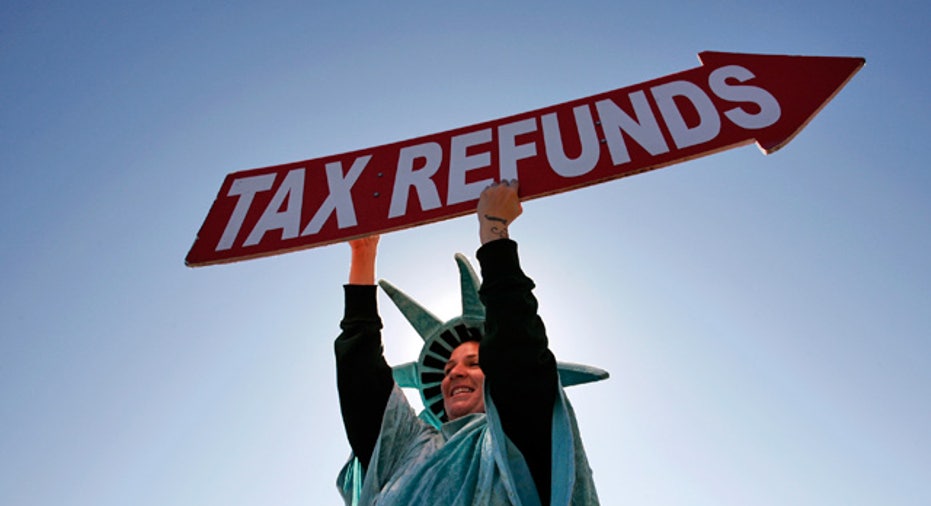How a Prepaid Card Can Eat Your Tax Refund

Getting your tax refund back on a prepaid card may sound convenient, but does it make financial sense?
For those without bank accounts, a prepaid debit card may be the fastest way to get an income tax refund. It's an option offered by all the major tax preparers. But for those with bank accounts or who can wait a little longer, choosing to direct deposit into a checking or savings account or simply holding out for the traditional government check may save money.
'I Need My Money Now!'
The average tax refund last year totaled $3,000 -- not a paltry sum for most households. Seven in 10 of those refunds were directly deposited into taxpayers' accounts, according to the Internal Revenue Service.
"You're going to get it quicker, and it's going to be more secure than a check," says David Newville, senior policy analyst at the Center for Financial Services Innovation.
Direct deposit isn't just for bank accounts, either. Refunds can be loaded up on a prepaid card and treated as direct deposits.
That means taxpayers without bank accounts who want their cash ASAP can choose direct deposit. Additionally, if they e-file their tax return, the IRS will send the tax refund back in as little as 10 days, according to the agency's website.
States such as New York, Georgia, Louisiana, Oklahoma, Connecticut and South Carolina also give taxpayers the option of receiving state tax refunds on prepaid debit cards issued directly from the state. Check with your state's tax or revenue department online to find out.
A Budget Helper?
Have a special project in mind for that tax refund but worried the money will disappear quickly amid your everyday purchases? Putting an income tax refund on a prepaid debit card is one way to keep the money separate from other accounts.
"You might not want to dump it into a bank account because it might get lost in day-to-day charges," says Ben Jackson, a senior analyst of Mercator Advisory Group's Prepaid Advisory Service.
Of course, there are other ways to keep your tax refund from commingling with your other money. Consider depositing the refund into a savings account you don't use.
Or put the tax refund into a short-term certificate of deposit. Your refund will earn interest (though not much in this interest rate environment), and you won't be tempted to withdraw money before the term is up because you will likely pay a penalty. It's a good way to keep undisciplined budgeters from spending earmarked money.
Watch Out for Fees
The biggest downside to receiving your income tax refund on a prepaid debit card is the myriad fees that come with the cards.
"You have to pay to access your own money," says John Ulzheimer, president of consumer education at SmartCredit.com. "You're going to see your hard-earned tax refund nickeled and dimed to death with fees."
A prepaid card can feature an enrollment fee, a monthly maintenance fee, ATM withdrawal fees, ATM balance inquiry fees and a fee to convert the remaining balance into a bank check, among others.
"If you have a bank account, there's no advantage whatsoever to getting your tax refund on a prepaid card," says Joe Ridout, consumer services manager for Consumer Action, a San Francisco-based consumer advocacy group. "You needlessly would forfeit some of your tax refund with the fees that come with these cards."
For those without bank accounts, Ridout encourages them to open one because a prepaid card is "a solution that will cost you money." To find a free checking account, Ridout encourages consumers to look to smaller banks and credit unions in their area.
"Free checking is disappearing," Ridout says. "But it is available if you look beyond megabanks."
Consumers reluctant or unable to open bank accounts would be better off receiving their income tax refund by paper check rather than on a prepaid card, Ulzheimer advises.
"At least with check cashing, you know how much you're going to pay," Ulzheimer says. "There are no hidden fees."
For example, if you receive a $500 tax refund from the IRS, it will cost up to $3 to cash that check at a Walmart store, according to the retailer's website. Walmart charges $3 up to $1,000 and $6 for any checks worth more than $1,000. It also limits check-cashing to $5,000.
Put that same $500 tax refund on a TaxAct Endeavor Card, and you're out $16.95 for the enrollment fee (see chart). If you take out money at an ATM twice on the prepaid card, you can subtract another $3.90 from your tax refund. And that doesn't count any surcharges the owner of the ATM may charge.
Some prepaid cards are costlier than others. The fees run the gamut. Because fees on prepaid cards vary so widely, it's important to study the terms and conditions carefully before putting your tax refund on a prepaid card.
"They really need to read the fee structures and understand what they're buying," Jackson says. "There's a big difference in the cards and the fees."
Bankrate.com breaks down some of the fees on four prepaid cards offered by popular tax preparer companies. The table doesn't include all fees on the cards.



















